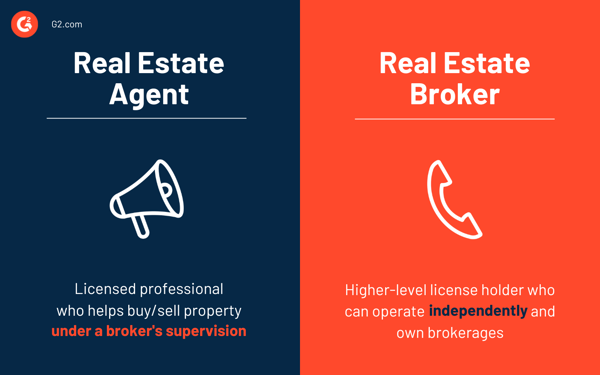October 1, 2025
 by Izabelle Hundrev / October 1, 2025
by Izabelle Hundrev / October 1, 2025

Every industry has jargon. Real estate is no different.
Like other professions, real estate is filled with different terms and buzzwords that are widely used by those who work in the space. For everyone else, a lot of this language is just plain confusing.
When it comes to job titles, you often hear “broker” and “real estate agent” used interchangeably. However, these titles don’t exactly mean the same thing and even require different skill sets and responsibilities in order to earn them.
If that’s the case, then what exactly is the difference between a broker and agent? To clear things up, we’ll break down each job title, what they do, and how they’re different.
If you already work in real estate, brokerage management software can help you work faster and stay on top of things.
The main difference between a real estate broker and agent is that a broker can work independently and supervise agents, while an agent must work under a licensed broker. Brokers have more training and are licensed to manage their own firms, while agents help clients buy and sell property under broker supervision.
These job titles are pretty similar, so it’s easy to see how they can get mixed up. While both of these positions are related to real estate, the main difference comes down to licensing and experience.

Before we get into details about their jobs and skills, it's important to note that these definitions are generally applicable to most states, but there are always exceptions. Some states have stricter real estate regulations and assign unique definitions to these terms. If you’re seeking further clarification, it’s always best to check the requirements in the state where you live.
An agent is the title that most people think of when talking about real estate professionals. For people looking to get into the industry, this is the starting point. Agents are responsible for meeting with clients, hosting open houses and doing everything else involved in selling property.
In order to become an agent, an individual must take a series of real estate classes and pass a final licensing exam that is unique to the state in which they live. To legally sell property, an agent must work under a licensed broker. Agents cannot operate independently.
Most agents make money through commission, which is usually a percentage of the property’s selling price. The payment structure can vary greatly, depending on the brokerage for which an agent works. As a starting point, being an agent allows an individual a lot of opportunity to gain experience as they begin their career in real estate.
Real estate agents play a crucial role in the buying, selling, and renting of properties. These duties include, but are not limited to, the following:
To thrive in the real estate domain, agents need diverse skills. Here are 6 key skills they need to be successful at their job:
Tool tip: Real estate agents often rely on Real Estate CRM Software to manage leads, listings, and communication efficiently.
A broker is an individual who has taken their real estate career beyond the agent level. To become a broker, an individual needs further education and must take a separate licensing exam. Once all the necessary licensing requirements are met, a broker can sell property independently or choose to open a brokerage firm where they manage and supervise other agents.
Brokers have a lot more freedom to structure their real estate career path. If they choose to operate as an independent agent, they have more flexibility in their work life since they’re not working for someone else’s firm. They also have the option to open their own brokerage firm and hire real estate agents to work under them. Having a broker’s license also opens the door for opportunities in property management.
All of these options allow the broker to explore different commission structures that will ultimately play to their benefit. It’s more difficult to become a broker, but many see the payoff as well worth the continued education.
Real estate brokers oversee multiple business areas, from finance to law to mentoring other real estate professionals.
Real estate brokers need a diverse set of skills beyond communication and negotiation to manage transactions effectively and lead their teams.
To make things more complicated, you may also hear the realtor title being used. A realtor is an individual who is a member of the National Association of Realtors (NAR), a trade association for real estate professionals. By becoming a member, realtors agree to abide by a strict Code of Ethics laid out by the NAR. It’s important to note that becoming a member of the NAR is not exclusive to agents or brokers. Property managers, appraisers, and even counselors are able to join the NAR as members.
Please note: Not all agents or brokers are Realtors, but all Realtors must be licensed professionals.
| Criteria | Real estate agent | Real estate broker | Realtor |
| License required | Yes | Yes (Advanced) | Yes (via NAR membership) |
| Can they operate independently? | No | Yes | Varies |
| Can they manage other agents? | No | Yes | Varies |
| Education level | Basic pre-licensing | Additional coursework + broker exam | Not tied to education |
| Income range (US avg) | $55,000–$85,000 | $75,000–$150,000+ | Varies |
| Membership required? | No | No | Yes (NAR) |
Thinking about leveling up in your real estate career? Becoming a broker isn’t just a title change, it comes with greater autonomy, earning potential, and leadership responsibilities. Here's a streamlined but complete look at the typical path from agent to broker.
This is your starting point. To legally sell or represent property, you'll need to:
Once licensed, you can start working with clients under a broker’s supervision.
Most states require you to spend 1–3 years actively working as an agent before you’re eligible to apply for a broker license.
During this period, you’ll:
Tip: Keep records of your closed transactions as they may be required as proof of experience when applying for your broker license.
Once you meet the experience threshold, you’ll need to take broker-specific coursework, which often includes:
Course requirements vary by state but are generally more in-depth than agent-level training.
Next, you’ll sit for your state’s broker exam, a more rigorous test than the agent version.
It usually covers:
In some states, you’ll also need to pass a background check or submit fingerprinting during this phase.
Once you pass the exam and fulfill all application steps, you’ll receive your broker’s license.
At this point, you can:
The full process can take 2 to 5 years, depending on:
Bottom line: If you're serious about real estate as a long-term career, becoming a broker can offer significantly more freedom, responsibility, and financial upside.
Here’s when to work with each type of professional:
| Scenario | Best fit |
| First-time homebuyer | Agent or broker |
| High-stakes commercial deal | Broker preferred |
| Need local guidance + handholding | Agent with local expertise |
| Selling multiple investment properties | Broker with team |
| Want access to MLS and ethical standards | Realtor |
Pros of working with a broker:
Pros of working with an agent:
Real estate licensing isn’t uniform nationwide. A few examples:
Always check your state’s real estate commission or department of licensing for the latest requirements.
Have more questions? Find the answers below.
The main difference between a real estate broker and an agent is that brokers can operate independently and manage agents, while agents must work under a broker's supervision. Brokers complete additional education and licensing requirements, giving them authority to run real estate offices or handle complex transactions.
A real estate broker typically makes more money than an agent due to higher commission splits, the ability to run their own firm, and earning overrides from agents they supervise. Brokers often earn 10%–30% more than agents, depending on location, experience, and the size of their client base.
A real estate agent’s main responsibilities include listing properties, showing homes, negotiating offers, preparing contracts, and guiding clients through the buying or selling process. Agents also coordinate inspections, appraisals, and closings while ensuring compliance with legal and regulatory requirements.
A real estate broker’s duties include managing real estate agents, overseeing transactions, ensuring legal compliance, maintaining records, and operating their own brokerage. Brokers may also recruit agents, train staff, resolve disputes, and handle high-value or complex property deals directly.
The main difference between a realtor and a broker is that "Realtor" is a title for agents or brokers who are members of the National Association of Realtors (NAR), while a broker is a licensed professional who can work independently. All Realtors follow NAR's Code of Ethics, but not all brokers are Realtors.
To become a broker as an agent, complete the required experience (usually 2–3 years), finish broker-specific coursework, and pass your state's broker licensing exam. Most states require continuing education, a clean legal record, and proof of completed transactions under a supervising broker before licensing.
Yes, real estate brokers supervise agents by overseeing transactions, ensuring legal compliance, and providing training and support. Brokers are responsible for reviewing contracts, resolving disputes, and making sure agents follow state laws and ethical guidelines.
Hiring a broker offers more expertise and oversight, especially for complex or high-value transactions. However, most agents are fully capable for standard buying or selling needs. Brokers may charge higher fees, so clients should choose based on transaction complexity, budget, and the professional’s experience.
The main difference between broker and agent licensing is that brokers must complete more education, have 2–3 years of experience as an agent, and pass a separate broker exam. Agents need to complete a pre-licensing course and pass a state exam. Brokers also meet higher ethical and legal standards.
The main difference between working with a broker vs an agent is expertise and cost. Brokers offer more experience and can handle complex deals, but may charge higher fees. Agents are typically more accessible and cost-effective, making them ideal for standard transactions. The right choice depends on your needs.
It’s no secret that real estate job titles can get a little confusing. The differences might be minor, but it’s important to be well-informed on the subject, especially if this is a career path that interests you. You can now be sure that next time you hear someone refer to a broker or agent, you’ll be in the know.
Now that you know the difference between a real estate broker and an agent, brush up on the rest of your real estate vocabulary with this complete glossary of terms to know.
This article was originally published in 2019. It has been updated with new information.
Izabelle is a Partner Marketing Specialist at InStride and a former content specialist at G2. Outside of work, she is passionate about all things pop culture, food, and travel. (she/her/hers)
What comes to mind when you hear the term “real estate”?
 by Izabelle Hundrev
by Izabelle Hundrev
Whether it’s a home or a commercial property, selling real estate is no simple feat. That’s...
 by Izabelle Hundrev
by Izabelle Hundrev
The primary goal of investing is to end up with more money than you started with.
 by Izabelle Hundrev
by Izabelle Hundrev
What comes to mind when you hear the term “real estate”?
 by Izabelle Hundrev
by Izabelle Hundrev
Whether it’s a home or a commercial property, selling real estate is no simple feat. That’s...
 by Izabelle Hundrev
by Izabelle Hundrev


